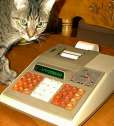Sharp PC-1500
| Datasheet legend
Ab/c:
Fractions calculation
AC: Alternating current BaseN: Number base calculations Card: Magnetic card storage Cmem: Continuous memory Cond: Conditional execution Const: Scientific constants Cplx: Complex number arithmetic DC: Direct current Eqlib: Equation library Exp: Exponential/logarithmic functions Fin: Financial functions Grph: Graphing capability Hyp: Hyperbolic functions Ind: Indirect addressing Intg: Numerical integration Jump: Unconditional jump (GOTO) Lbl: Program labels LCD: Liquid Crystal Display LED: Light-Emitting Diode Li-ion: Lithium-ion rechargeable battery Lreg: Linear regression (2-variable statistics) mA: Milliamperes of current Mtrx: Matrix support NiCd: Nickel-Cadmium rechargeable battery NiMH: Nickel-metal-hydrite rechargeable battery Prnt: Printer RTC: Real-time clock Sdev: Standard deviation (1-variable statistics) Solv: Equation solver Subr: Subroutine call capability Symb: Symbolic computing Tape: Magnetic tape storage Trig: Trigonometric functions Units: Unit conversions VAC: Volts AC VDC: Volts DC |
| ||||||||||||||||||||||||||||||||||||||||||||||||||||||||
Sharp PC-1500
 Its bulk suggests that the PC-1500 is an earlier model than that classic Sharp BASIC programmable calculator, the PC-1211. However, its display suggests otherwise: the PC-1211 used an early, yellow LCD display, while the PC-1500 has a modern, gray display.
Its bulk suggests that the PC-1500 is an earlier model than that classic Sharp BASIC programmable calculator, the PC-1211. However, its display suggests otherwise: the PC-1211 used an early, yellow LCD display, while the PC-1500 has a modern, gray display.
Why is it so bulky, then? I can only speculate. To be sure, it has a memory expansion port that the PC-1211 lacks, and it also has a more functional I/O port.
The programming model of the two machines is very similar (indeed, many later Sharp BASIC machines utilized a very similar BASIC implementation.) The biggest drawback is the lack of keyboard shortcuts: whether in immediate mode or program entry mode, all BASIC keywords must be spelled out by hand on the small QWERTY keyboard.
The machine's programming model is illustrated by the following example, computing the logarithm of the Gamma function to high precision:
10:INPUT X 20:Z=ABS X 30:G=2.506628275+6.3E-10+(225.5255846+1.9E-8)/Z-(268.2959738+4.1E-8)/(Z+1) 40:G=G+(80.90308069+3.5E-9)/(Z+2)-(5.007578639+7.1E-10)/(Z+3) 50:G=LN(G+(.011468489+5.435E-10)/(Z+4))+(Z-.5)*LN (Z+4.65)-Z-4.65 60:IF X>0THEN 90 70:RADIAN 80:G=LN (π/X/SIN (π*Z))-G 90:PRINT G,EXP G

